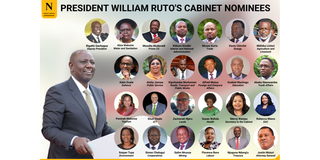Premium
Inside President Ruto’s costly and more bloated Executive

President William Ruto's Cabinet.
President William Ruto will have a bigger government compared to his predecessor, with seven more principal secretaries (PSs) lined up for the new administration. This will see taxpayers fork out at least Sh321 million more in salaries alone over the next five years, with PSs being among the super-earners in public service.
This excludes hundreds of millions that will go to hefty perks such as house, travel and entertainment allowances, as well as medical cover.
It also doesn’t include the “golden parachute” the officers will earn at the end of their terms in gratuity payment, which is equivalent to 31 per cent of annual basic pay for every year served.
Also read: Big names miss out as Ruto names Cabinet
The new development comes at a time when the country is grappling with a high cost of living, runaway public debt and drought. The President last week acknowledged these challenges while suggesting a Sh300 billion cut on the country’s budget as part of austerity measures.
A leaner number
President Ruto tweaked his government, increasing the number of state departments to 49, a marked departure from the Uhuru Kenyatta administration, which had a leaner number of 42.
The unveiling of the new state departments came after the President named his new-look Cabinet after sending home all the Cabinet Secretaries (CSs) in the outgoing administration, save for Mr Simon Chelugui and Ms Monica Juma. The Public Service Commission (PSC) advertised for the PS vacancies on September 7.
PSs earn Sh765,188 in gross monthly salary, the same as the Inspector-General of the National Police Service and Director-General of the National Intelligence Service.
This is according to the new pay structure the Salaries and Remuneration Commission (SRC) announced. Using the new salaries, the seven additional PSs will cost Sh5.4 million more every month or Sh64.2 million annually for the next five years.
In September 2012, SRC raised allowances for PSs, with such officers taking home a domestic allowance of Sh50,000, a house allowance of Sh100,000 and an entertainment allowance of Sh100,000. A PS answers to a CS and is the accounting officer for the state department.
The Ministry of Health, which had a single state department, will now have two—Medical Services and Public Health.
The Ministry of Interior and National Administration will now have three state departments.
Split into two
The previous regime had two. Government Coordination will now be a state department under the Office of the Prime Cabinet Secretary headed by Amani National Congress leader Musalia Mudavadi.
The Ministry of Foreign Affairs has been split into two state departments and the name altered to Ministry of Foreign and Diaspora Affairs with the departments now identified as Foreign Affairs and Diaspora Affairs.
The Ministry of Transport, Infrastructure, Housing, Urban Development and Public Works has been rejigged to read Ministry of Roads, Transport, and Public Works with three departments —Roads, Transport and Public Works.
The split of the giant Ministry of Lands, Housing and Urban Development will give it three state departments in Lands and Physical Planning, Housing and Urban Development.
Trade, Investment and Industry ministry will have three departments from two in the previous government. These are just some of the rejigged ministries that have brought about the additional number of state departments in the Ruto administration.
Should the President Ruto copy his predecessor who created the Chief Administrative Secretary post in every ministry, then this could lead to an even more bloated executive. This is considering that there are four Cabinet-level appointments also factored in.





